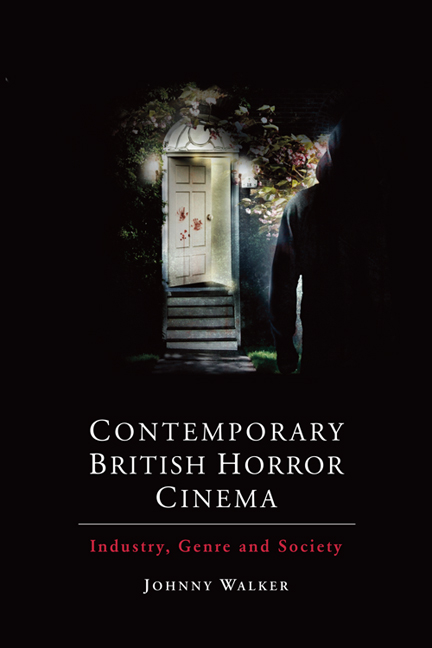2 - British film production and the horror genre
Published online by Cambridge University Press: 05 August 2016
Summary
The first decade of the new millennium saw British horror film production increase exponentially. Whereas only a smattering of horror titles were produced in Britain from 1990 to 2000, by the end of 2010 more than 400 had been released in one format or another, with a further 100 having appeared as of 2014.2 This ‘British horror revival’ – as it has subsequently come to be known (Simpson 2012: 11) – ran concurrent with a variety of shifts that were taking place across British film and film culture. These included shifts in the increasingly global prominence of British cinema at the international box office; the changing tastes of domestic audiences; and changing critical attitudes to the horror genre that, for centuries, was subjected to the most vociferous of criticisms by the popular press and society's moralists. Horror film producers in the UK responded to these changes, aided largely by a boom in cheap digital filmmaking technologies, which prompted the production and distribution of micro-budget genre films, as well as some significant shifts in governmental film policy that abetted the development of higher-profile horror movies. While the majority of filmmakers during this period secured funding through private investors (or in many cases self-funded their own films), the introduction of tax relief for British films in 1997 (for films with budgets of less than £15m), and the birth of the UK Film Council (UKFC) in 2000, anticipated financial support for popular genres such as horror – or, to quote the UKFC, ‘the development, production and export of films that attract audiences in the UK and all over the world’ (UKFC 2000: 3).
This chapter considers the re-introduction of the horror genre to the production slates of British filmmakers after the year 2000, addressing the kinds of films that emerged during this period and what key factors contributed to the horror genre's economic buoyancy amid other production trends in local and international cinema. For neatness, the chapter is split into two sections. The first of these, ‘(Re)establishing Horror as a popular British genre’, considers how the horror film featured amid the ‘commercially minded’ rhetoric of the UKFC and its supporters from 2000 to 2004 (Leggott 2008: 17).
- Type
- Chapter
- Information
- Contemporary British Horror CinemaIndustry, Genre and Society, pp. 14 - 37Publisher: Edinburgh University PressPrint publication year: 2015



